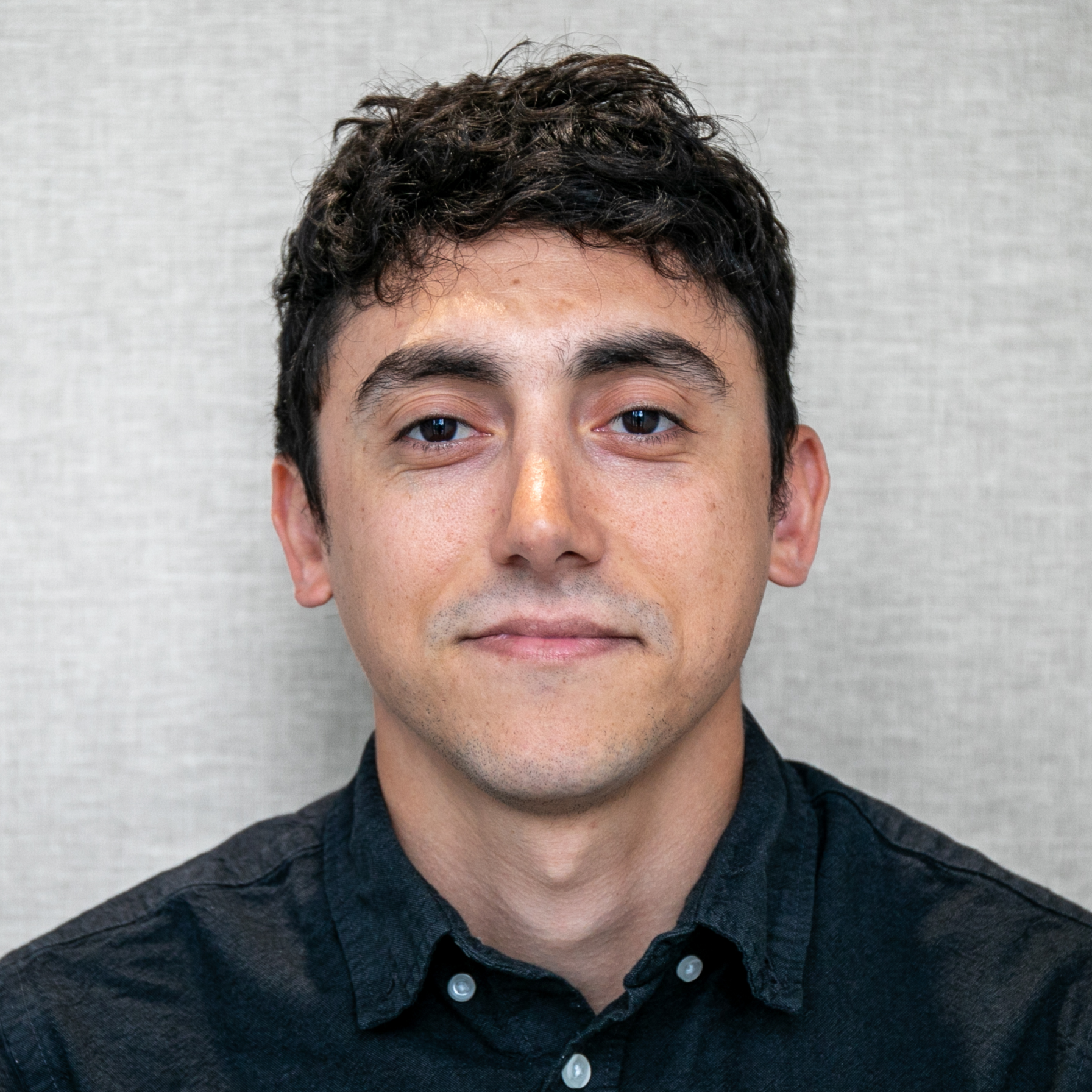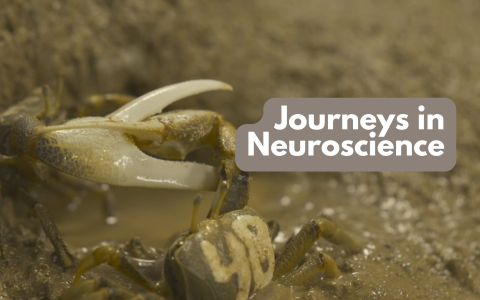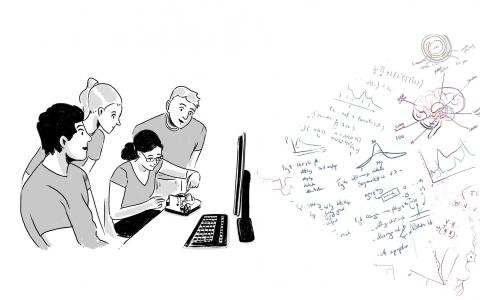
From simulation theory to sleep science: a journey into the brain
An interview with Dr Volkan Uzungil, conducted by Alison Cranage.
For Dr Volkan Uzungil, a fascination with the brain was first sparked in an undergraduate lecture at Melbourne University, when a professor posed the theory that our entire reality is a computer simulation, endlessly repeating. The idea, coupled with the brain being described as the most complex structure in the universe, set him on a path towards neuroscience and questions of how we make sense of the world.
Now a Research Fellow in Dr Julia Harris’ group at the Sainsbury Wellcome Centre, Volkan investigates one of the brain’s greatest mysteries: sleep. Everyone needs sleep, but most of what happens in the brain during slumber remains unknown. How do our dreams shape our memories? Why do we sometimes wake with sudden clarity?
In this interview, Volkan reflects on his journey into science, the challenges of research, and where the next discoveries in neuroscience might come from.
Why did you become a scientist?
It’s interesting to think about this, as you don't really reflect on it day-to-day. I made a decision when I was an undergraduate. Discussions with people who were studying humanities or law seemed to be based on arguments that you could make. You were trying to convince people, and if you couldn't get them to see your point of view, it was quite frustrating.
I think what I liked about being a scientist is that we're trying to pursue the truth. While there may be different opinions about a particular scientific topic, we aim to get to a point where the evidence has been proven, and it's as close as we can get to the truth.
Can you tell me about your career? How did you move into neuroscience?
I did a Bachelor of Science at Melbourne University in Australia, which was quite a general course. It was a class in my second year where one of the lecturers said something really interesting. He was talking about a combination of computing, neuroscience and artificial intelligence. He said that we will get to a point where it's feasible that you will be able to transport all brain functions onto an artificial computer. When that happens, you've emulated the human mind on a computer. This could be happening again and again in a cycle that we are continuously repeating. He said it is statistically more likely that we are in one of those computer simulations than not.
I'm not sure if that's a reason why someone should study neuroscience, but that was what got me fascinated.
The brain is the most complex thing in the universe. Understanding the brain is also critical for how we interact with everybody in our lives and the world. Sometimes, a lot of the difficulties we have are about being able to connect with other people and communicate our emotions and what we're thinking. So I think being able to understand that will also allow us to live more harmoniously.
What brought you to sleep research, and what are the main questions you're looking at now?
In my PhD, I studied genetic factors that predispose you to have cognitive deficits, particularly schizophrenia. That was aimed at understanding how brain cognition is dysfunctional, but it made me realise we don't understand cognition in the healthy brain.
So now, in my postdoc, I am looking at the mechanistic underpinnings of learning and memory.
When you are learning a new task or revising for an exam, and it just doesn't all fit together, sometimes, you sleep on it and the next day when you wake up, you have this new clarity. Everything makes sense. But how does sleep do that?
There's been a lot of research in trying to understand learning in awake behaviour when an individual or a mouse is doing a task. But technological advancements have now allowed us to be able to look at what's occurring during sleep, and that's really under-researched and not well understood.
When we’re asleep, how does that influence our ability to complete a task in the future? How do rest and sleep contribute towards learning and the consolidation of memories?
How do you study that?
We're studying mice while they perform an olfactory task as smell is a mouse’s primary sense. Our task will have them learn initially that a particular smell is paired with a particular location of a reward, as they navigate within a habitat. We then introduce six odours, with the first five being irrelevant, and the reward indicated by the final odour, an association they previously learned. But there is a shortcut – we will then also introduce a hidden rule, where they can get the reward much more quickly – if they notice.
They are not going to get it straight away. But after doing it over and over on different days, we’re hoping that at some point the mouse will wake up and make that association – when I get to smell X, I don't have to wait all the way to the end, I can leave the trail early to get my reward.
How can you detect that it's sleep that's affecting learning, rather than the mouse learning the task while it’s awake?
The ultimate test would be for some mice to do this without any sleep, and compare performance with rested mice, but we can’t do that, as it introduces stress.
It is going to be difficult, but the aim is to first understand the mechanism in the brain which we think underpins how the brain learns the task while the mice are awake. Once we have that, we can block that neural activity when the mouse sleeps, and see if mice are still able to reach that insight about the task or not.
If we can do that, we’d be quite confident we have found a sleep-facilitated mechanism.
In future, do you think there will be a way we could manipulate that mechanism to help people with learning or memory difficulties?
Absolutely. Once we understand what these mechanisms are, and if we can pair that with technology that can activate or deactivate certain brain regions noninvasively, then this could help people with sleep apnea, for example.
These kinds of studies could also reveal links with neurodegenerative disorders where sleep is disturbed, like Alzheimer's disease. Maybe we can activate certain brain areas and help people get the beneficial effects of sleep.

Dr Volkan Uzungil
What are the biggest challenges of being a researcher?
One of the fun things, but also one of the difficulties, is that you have to solve all the problems yourself. Lab members are always willing to lend a hand, but they have their own projects.
Also, there are only so many hours in a day. You're tasked with reading papers, which is exciting as you keep up to date with the latest breakthroughs, you also have to do all the administrative aspects of being a scientist, and also try to optimise your experiments, analyse the results and make conclusions… it can feel like things move slowly. You just want to have the results quicker so you can do more and more research!
And what's the best thing?
I think the most exciting thing, particularly at SWC is that everyone is so curious and friendly. It's a real pleasure to come into work. No one is going to criticise your research or bring you down. Although we have different labs, everyone's got a final goal that we're all working towards – how the brain drives behaviour – which is nice.
I think that research more widely is a good environment where people are friendly and supportive.
What's the most exciting thing in neuroscience as a whole at the moment?
I think scientific discovery is only facilitated through technological advancements.
Take flexible electrodes. Previously, we had metal electrodes which could record from the brain, but not for long periods of time. Now, we have flexible electrodes which don’t cause scarring and can be implanted for much longer periods. This is essential if you want to study sleep, or how the brain learns something over days or weeks.
What do you like to do outside of work?
I'm a keen hiker. I enjoy just being outside. In the past I've climbed multiple 6000 metre peaks. It's a bit harder to do in the UK though! I also enjoyed surfing back in Australia.
Being out in nature, being away from technology, you really get to recharge your batteries and also reflect on what you're doing - sometimes even your research. You can have some important thoughts when you're away from it all.
If you weren't a scientist, what would you do?
That’s an interesting one because I always would have wanted to be a historian – very different to becoming a scientist.
I'm very interested in historical books, historical periods, and maybe this is also related to neuroscience, trying to understand how people thought about the time in history that they were in. What were their biases, their emotions? How did they perceive the world?
If you could time-travel, where would you go?
I’d go to the early 1900s. It was a period of social change and upheaval. A lot of new technologies were being introduced that change people's way of life – maybe there are a lot of parallels to how our world is right now.
There was an aristocracy – people had their social class, and they stuck to that for centuries. But in that time, new technologies allowed people to create their own lives.
I don’t think we were good at using these new technologies, which maybe manifested in the conflicts that we had in the 20th century. I'd be interested to see how people were perceiving the world then.
Find out more
Volkan's background is in behavioural neuroscience (PhD at University of Melbourne) which he has combined with bioengineering experience (post-doc at Imperial College) to utilise experimental and analytical techniques to understand cognitive function.
He is currently a Research Fellow where he aims to understand how sleep as an offline process supports the consolidation of learnt experiences to memories. To answer this question, he works at the intersection of neurophysiology and computational neuroscience by applying mathematical concepts to population neural activity datasets. His primary interest is in the development and utilisation of neurotechnology to both understand mechanisms of brain function and treat cognitive disorders.


